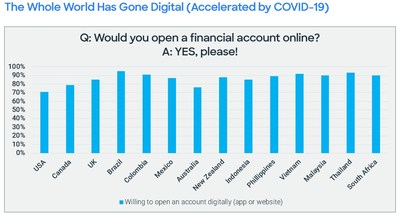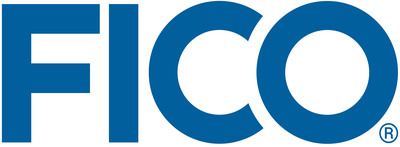New FICO Research Shows an Accelerated Digital-First Mindset: 71% of U.S. Consumers Willing to Open a Bank Account Digitally, Signaling the Need for More Engaging and Personalized Financial Experiences
HIGHLIGHTS:
- FICO released new research looking at the impact of COVID-19 on digital transformation in financial services, particularly with customer-willingness for digital account openings
- 62% expect to be able to prove their identity digitally, but if asked to move out of digital channels (such as visiting a branch) during the digital account opening process, only 21% said they would eventually complete the added steps
- A greater percent of Gen Z prefer non-digital channels than older generations – 29% of respondents between ages 18-24 prefer to use phone call or mail to open a financial account versus less than 8% of those over 65
- Half of all customers abandon the digital onboarding process if they have to answer more than 10 questions
Leading digital decision platform company, FICO, today released research which found that the COVID-19 pandemic accelerated a digital-first mindset in financial services, with 71% of
The research shows that the idea of a digitally savvy Gen Z does not always extend to financial services, and younger consumers may not be as financially literate as older consumers. While a majority does prefer digital, there is no definitive preference for opening accounts digitally among young respondents (ages 18-24) as nearly a third (29%) prefer to use slower and friction-filled methods, such as phone call or mail to open a financial account. This trend is not apparent in older age groups (over 65) as only 6% of
"Digital literacy does not necessarily equate to financial literacy, and in the
Younger users may find the banking apps intimidating or unapproachable. Less than half of
Global Growth Economies Embrace Digital with High Smartphone Penetration
The appetite for digital account opening is highest in growth economies, such as
Preferences, Preferences, Preferences
For digital account openings in the
When taking steps to open a digital account, for most online accounts, customers were prepared to answer up to 10 questions. If more than 10 questions were present, 50% of customers abandon the onboarding process. Digital mortgage applications were the only exception where 18% of
Customers also have high expectations of being able to complete all related tasks for digital account opening via digital channels with 62% of respondents expecting to prove their identity digitally in particular. If asked to move out of digital channels at any point during the digital account opening process, such as posting documents or visiting branches to complete an application, 10% of respondents give up completely on an application and 15% go to a competitor. Only 21% said they would eventually complete the extra steps on a slower timeline. The friction and disruption results in lost customers—and once they're gone, they're often gone for good.
"Digital account opening services are now 'table stakes' for financial institutions to attract new customers or build more robust offerings for existing ones. The focus really should be on providing an engaging, educational, and adaptive customer experience,"
Not All Friction is Bad
While frustrations like too many questions can mean abandoned digital applications, not all friction is bad. Thoughtfully designed points of friction can be extremely valuable for managing risk and making customers feel safe.
Learn more about the research findings here, and for more guidance on effective digital transformation in financial services, check out FICO's digital banking commandments here.
FICO is committed to helping every generation build financial literacy through financial education programs like "Score A Better Future," which helps consumers improve their understanding of their FICO® Scores and overall financial health, as well as the FICO® Score Open Access program that enables participating financial institutions to offer consumers free access to their FICO Scores.
About FICO
FICO (NYSE: FICO) powers decisions that help people and businesses around the world prosper. Founded in 1956 and based in
FICO is a registered trademark of
Learn more at https://www.fico.com.
![]() View original content to download multimedia:https://www.prnewswire.com/news-releases/new-fico-research-shows-an-accelerated-digital-first-mindset-71-of-us-consumers-willing-to-open-a-bank-account-digitally-signaling-the-need-for-more-engaging-and-personalized-financial-experiences-301361278.html
View original content to download multimedia:https://www.prnewswire.com/news-releases/new-fico-research-shows-an-accelerated-digital-first-mindset-71-of-us-consumers-willing-to-open-a-bank-account-digitally-signaling-the-need-for-more-engaging-and-personalized-financial-experiences-301361278.html
SOURCE FICO
Greg Jawski for FICO, Email: greg.jawski@porternovelli.com, Phone: +1 212-601-8248


